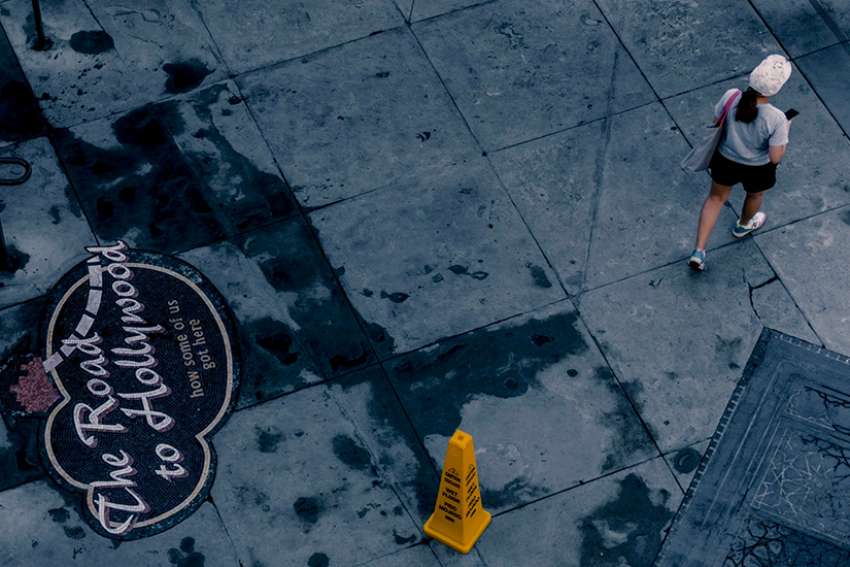A woman walks along Hollywood Blvd. Voluminous voices made it clear in the aftermath of the exposés of Weinstein’s vile assaults that his conduct was like an open sewer running through Hollywood.
By specchio.nero, CC BY-SA 2.0, https://commons.wikimedia.org/w/index.php?curid=46346072
Comment: Weinstein a symptom of an even uglier issue
By Peter Stockland
The exposure of movie mogul Harvey Weinstein’s sordid sexual predator secret is ripping the mask off the sinister nature of our supposed surprise as well.
Voluminous voices made it clear in the aftermath of the exposés of Weinstein’s vile assaults that his conduct was like an open sewer running through Hollywood. Everyone knew about it and simply held their noses — or their tongues — out of fear for his legendary reprisals. As one wag put it, a special kind of group courage was required once Weinstein was neutered by disgrace and careers were no longer at risk.
Equally unsurprising, though obviously entirely justified, has been the welter of commentary emphasizing — yet again — how a figure such as Weinstein is just a ghosting of what women are subjected to in the wide, wide world, not only the movie business. The portrait of the artist as decrepit sexual marauder is a mirror image from life itself, at least as far as many women experience it.
What is somewhat unnerving is the refusal to take the next natural step and genuinely examine why this repulsive state of affairs has become so ubiquitous in the past two generations. If something is such a significant problem — and clearly it is — the obvious question is why does it persist? Men are pigs might seem gratifying as a retort. It is hardly helpful as an answer.
Part of the impediment, of course, is the firm script lines that have been set by those who, for political purposes, prefer the easy epithet to more complex explication. The actress Mayim Bialik found herself afoul of those boundaries last weekend by writing an op-ed in The New York Times that she thought provided a feminist take on the Weinstein debacle. Alas, in her truly lovely piece, Bialik made the mistake of cautioning that in the imperfect world we inhabit, however justly or unjustly, dress and comportment are still crucial to prudence.
“In a perfect world, women should be free to act however they want. But our world isn’t perfect. Nothing — absolutely nothing — excuses men for assaulting or abusing women. But we can’t be naïve about the culture we live in.”
The ensuing social media accusations of “victim blaming” were so intense that Bialik was forced to clarify her intentions, mainly by reiterating her “nothing — absolutely nothing — excuses men...” caveat. Nothing can cut short the search for understanding like an immediate, vicious attack on one part of one line of inquiry.
And it may well be this very process of truncation is responsible, not for the begetting of Weinstein et al, but for our inability to confront and overcome their ultimate sources. We want to solve the problem at the surface, not the root, meaning we declare a priori off limits even the hint of a possibility of a theological answer. Yet as Fr. Julián Carrón contends in the new English translation of his 2015 book Disarming Beauty, such censure cuts us off from the possibility of knowing each other by seeking God.
Carrón’s book goes far beyond the latest horror in Hollywood. It grapples with the crisis of the West — and so the Church — brought about by the loss of Christian presence in Enlightenment thought. But its message is as applicable to the immediate as to the broadly historical. Carrón makes the case that unless we are again “awakened” to God, we will continue to reduce humanity to a source of instrumental gratification of individual appetites: social, political, sexual. The ugliness represented by Weinstein, then, is indeed only one miniscule part of a monumentally larger conundrum, one that far exceeds valid concerns about sexual harassment and violence directed at women.
“The critical point of contemporary culture lies in the myopia with which it looks at the profound needs of man: not grasping the infinite scope of man’s constitutive needs, it proposes the infinite multiplication of partial answers,” Carron writes early on.
Simply ripping the mask off fresh sordid secrets will do nothing to enlighten us in the face of those partial answers. Only by opening our eyes to each other as image bearers of God can we be authentically surprised enough to understand in our awakened hearts the true meaning of human love.
(Stockland is publisher of Convivium.ca and a senior fellow with Cardus.)
Please support The Catholic Register
Unlike many media companies, The Catholic Register has never charged readers for access to the news and information on our website. We want to keep our award-winning journalism as widely available as possible. But we need your help.
For more than 125 years, The Register has been a trusted source of faith-based journalism. By making even a small donation you help ensure our future as an important voice in the Catholic Church. If you support the mission of Catholic journalism, please donate today. Thank you.
DONATE

